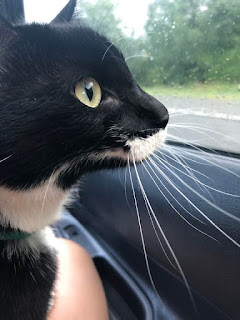This post is a brainstorming post for my Storybook semester project. Below, I will list four topics that I am interested in using for this project:
- The lais of Marie de France. Since I am a French major, it should come as no surprise to you that I have some familiarity with Marie de France. For those of you who don't know her work (which, reasonably, is most of you), she is a twelfth century poet from (you guessed it) France. She wrote in the form of what she called "lais," which are essentially fairy tales told in lyrical form. All in all, she wrote twelve lais, several of which I had the opportunity to read in my medieval French literature class. I would be especially interested in retelling some of these stories from the point of view of some of the side characters, or perhaps in altering the endings a bit. The stories are quite interesting, but some of the morality-related themes in them are so far from what is valued today, so I think it could be fun to address that through retelling. For example, ten of the twelve lais include adultery, and usually it is portrayed as a good thing in these stories. Obviously cheating on your spouse is not encouraged today, nor was it at that time in most of world literature, so it might be interesting to tackle that topic and see how the stories are changed if today's value system is imposed on them.
If I choose this as my topic, I will likely find an English translation online of the specific lais I'm planning to include, but for now here is a collection of all twelve in their original Old French.
Image of Marie de France from an illuminated manuscript - Sea monsters. To be honest, I have very little background when it comes to mythology and folklore about sea monsters, but I'd be excited to learn more about it! Despite my Midwestern heritage, I have always been just absolutely fascinated by the ocean and all its mysteries. It's simultaneously terribly intriguing and honestly quite terrifying to me, knowing just how little we know about the dark depths and what dwells there. I read online recently about a living shark that was discovered a few years back that is believed to be between 272-512 years old! That's older than our country! Plus, it's so interesting to hear about sea monster-related myths and consider what ocean-lurkers could have been behind their origins (for example, the theory that stories of mermaids came from seals/walruses/manatees, or that the kraken could have been a giant squid or eel of some sort). So I think it'd be really fun to do retellings of some of the old sea monster stories, but taking into account the (still very limited) knowledge of the sea that we have today. Here is a link to some sea monster stories included in the Untextbook.
- Food. I saw this in the list of topic ideas and was immediately reminded of the book Like Water for Chocolate. For anyone who hasn't read it, it is a magical realism book told from the perspective of a Hispanic woman whose emotions pour into the food she makes and have wild effects on the people who eat it. I think it could be really interesting to incorporate that idea with foods of other cultures, or potentially to take myths that already include eating some kind of food and re-imagine them through that lens. For example, in this story about three sons and a king, one son claims to be a connoisseur of food, so the father sets rice before him and bids him eat. The son says no, because the rice smells to him of burning corpses, and it turns out that the rice was grown in a field near a village crematorium. If emotions really could pervade food when it is prepared, then a field of food growing next to a funeral home would be potent indeed. Also, since I work as a baker, I have a personal interest in food and its preparation.
- Norse Mythology. I know nothing about Norse mythology, save for what comes with the Thor/Avengers movies (which I'm sure is totally accurate), and a little bit from a very abridge version of Beowulf. So this would be an interesting topic for me because I would be learning everything from scratch, so new impressions could be made. I think what little I know of this subject is intriguing, and I've heard people say there are a lot of interesting stories here, so I'd be game to check it out. Here is a link to The Heroes of Asgard, which seems like it would be a pretty good source for me!










